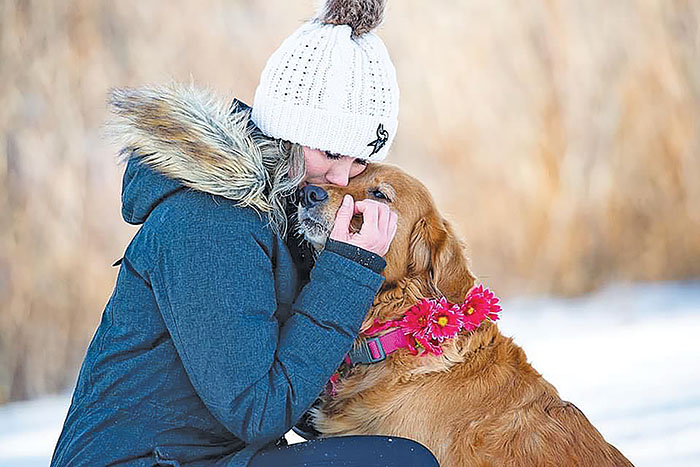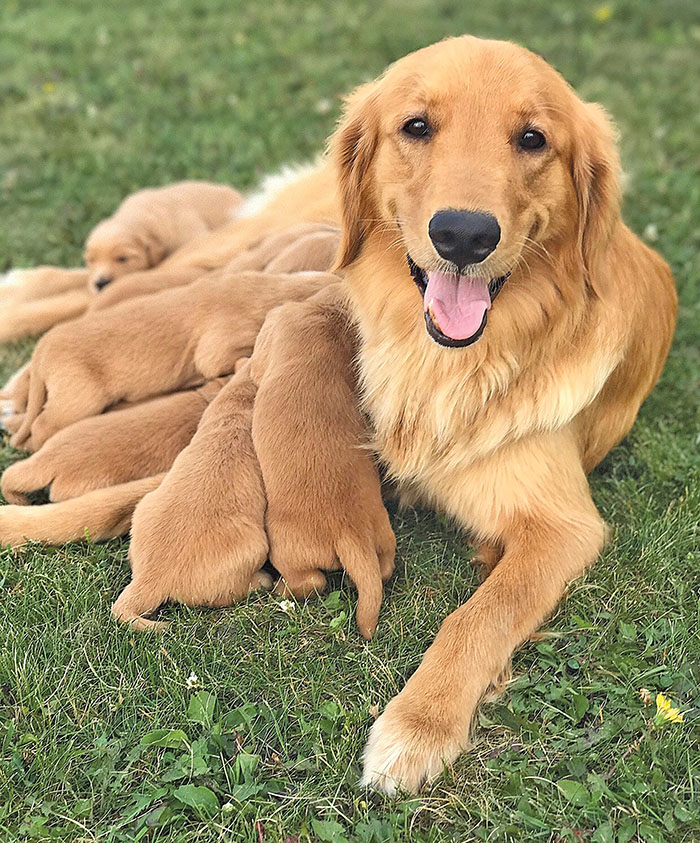Golden love, a love like no other
News | Published on February 9, 2021 at 4:38pm EST | Author: Chad Koenen
0
Jess Kuball snuggles with her girl Annie. Her dog’s health always takes precedence over breeding. After Annie was cleared by a vet she spent time with a neighbor’s stud and recently gave birth to a litter. Kuball has a waiting list of 18 people hoping for a pup.
Not all pure-bred breeders are puppy mills, FHS grad shares her experience
By Barbie Porter
Editor
Dog breeders can get a bad rap, but not all breeders are puppy mills. Some simply want to provide the joy of a specific dog breed to others.
Jess (Vukelich) Kuball grew up at Rose Shore Campground, which her mom DeAnn Anderson owns. Her family raised Rottweilers and then miniature schnauzers. Kuball learned about the responsibilities of breeding pure breeds, and all the doting on the dogs, vet checks and paper work that goes into it.
She also learned about golden retrievers from those staying at the campground.

“I fell in love with them,” she said. “They were so people oriented and so happy-go-lucky. As soon as I was on my own and bought a house, I knew I would buy a golden retriever.”
Those buying a pure bred dog should do their homework, as all breeds have health defects that are genetic. Kuball said golden’s can be prone to cancer as well as have problems with their hips, elbows, eyes and more.
Research helped Kuball find a pup with a strong bloodline that exhibited no cancer and was certified with strong hip and elbows.
“The vet will grade the parents on a scale, by age two and no earlier,” she said. “If they get a good score then their puppies will be good as it is a genetic trait, same as heart murmurs or disorder of the eyes.”
Kuball sought out a premium blood line with proper papers and certificates to have the best opportunity for a long life with her new bestie.
“The thought of breeding didn’t come along until er,” she said. “I was home, doing day care, and decided since I was home every day, it was a good time.”
“The vet will grade the parents on a scale, by age two and no earlier. If they get a good score then their puppies will be good as it is a genetic trait, same as heart murmurs or disorder of the eyes.”
Jess Kuball
The search for a stud didn’t take Kuball far from home. The Ada family learned a family down the road also had a long-standing love for golden retrieves. After exchanging information on bloodlines and reviewing vet records, the two agreed to provide the planet with healthy purebreds that would become loving, patient and comedic members of many families.
Kuball’s golden, Annie, who is now six, and her new beau, hit it off. The two have provided the world with four litters, with no more than one litter a year. Generally, the litters provide six to 10 pups, depending on how many times the couple gets together during the breeding cycle, Kuball said.
“Her health is always checked by a vet before, and if her health were ever in question, or there is the potential to harm her in any way, then breeding is out of the question,” she emphasized.
The most recent litter was born on Jan. 3, and Kuball plans to keep one female of the litter of nine pups. The rest are already spoken for, as she has a waiting list of 18 people that are located across the U.S.
“I get to know the people who are getting a puppy,” she said. “I ask for references and do some research on them.”
There have been instances Kuball has declined a request to buy a pup. For the most part, though, the families willing to buy a pure breed (which can cost $1,000 or more) tend have the time and financial stability to provide the dog with healthcare and the love it deserves.
For those that pass the background test, Kuball offers the pick of the litter to those that put the deposit down first.
“With COVID, there are some families further away that have been watching the pictures and videos I post,” she said. “I also learn about the families, and when the puppies personalities start showing around week 5-or-6, I can better match the pup to what the family wants.”
In addition to making sure the dogs are healthy and properly developing, Kuball also gives them sensory development and socialization.
Her step-daughter is a CNA in Ada, Minn. and the idea was presented to a senior living facility to bring the pups in for a visit. Kuball said the field trip was a hit, and an invite to a memory care unit in Crookston, Minn. was also presented.
“When we brought the puppies to the nursing home the residents said they hadn’t smiled so much in such a long time,” Kuball said, noting she and her daughter have both had the COVID-19 vaccine as she, too, is a nurse.
Kuball said she found reprieve from high stress job, which involved working in the COVID-19 unit, by going home, taking a hot shower and spending time with her dog Annie and the puppies.
“When you’re in a (plastic kiddie) pool of puppies it is hard to be crabby,” she said.
The pups generally open their eyes 10 days after birth and begin walking at five weeks. Shortly after they begin tugging at toys secured to the wall or floor and potty training starts at 6 weeks.
The AKC registered pups are raised in the family home, which means there may be a rambunctious play session in the midnight hour now that they are mobile. Kuball said when such an impromptu party seems to begin she turns on country music and the partying pups tend to doze off.
If the Kuball and her husband Mark opts to breed the puppy they plan to keep when she is of age and cleared by the vet, they will need to find a new father. Thoughts have been given to looking at finding one that has additional certifications or awards.
“If you breed, it takes a lot of research and the goal is to breed to improve the blood lines, to keep them healthy and breed for the better,” said the mother of three.
She has considered working with the pup to get titles in obedience and earning a good citizen certificate given to therapy dogs.

